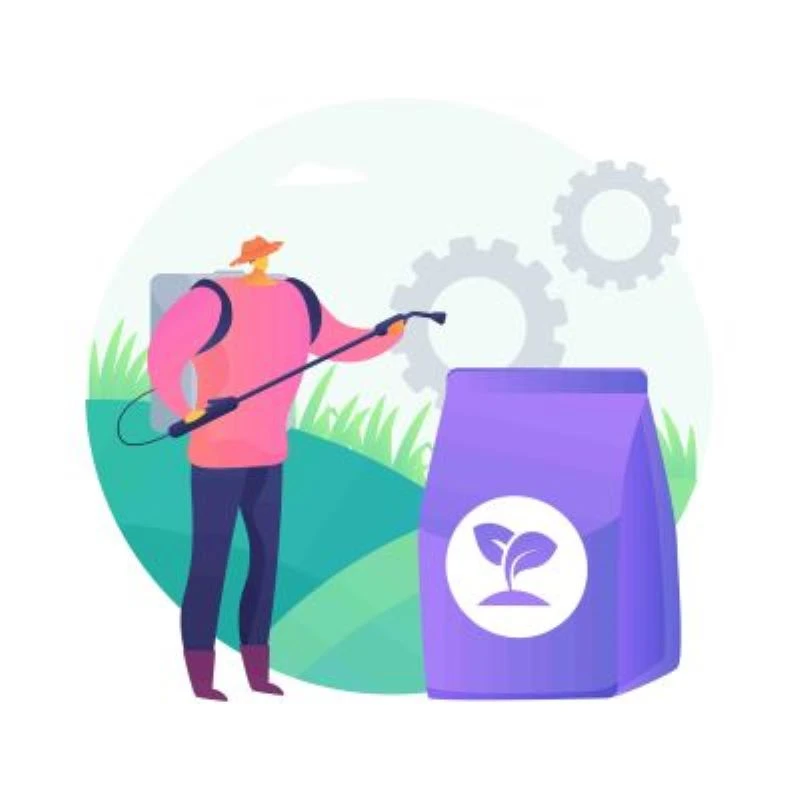Selecting the Right Tools for Precise Liquid Fertilizer Application
Selecting the Right Tools for Precise Liquid Fertilizer Application
Efficient and precise application of liquid fertilizers is crucial for maximizing plant health and achieving optimal yields. The choice of tools for applying liquid fertilizers can significantly impact the effectiveness of nutrient delivery and overall plant growth. With various tools available, from basic sprayers to advanced irrigation systems, selecting the right equipment is vital to ensuring that your plants receive the right amount of nutrients exactly where they need them. In this blog, we will explore different tools for liquid fertilizer application, their features, and how to choose the best one for your needs.

Marketing Consulting
It is a long established fact that a reader will be distracted by the readable content of a page when looking at its layout. The point of using Lorem Ipsum is that it has a more-or-less normal distribution of letters, as opposed to using 'Content here, content here', making it look like readable English.

Marketing Consulting
It is a long established fact that a reader will be distracted by the readable content of a page when looking at its layout. The point of using Lorem Ipsum is that it has a more-or-less normal distribution of letters, as opposed to using 'Content here, content here', making it look like readable English.

Understanding the Importance of Accurate Fertilizer Application
Accurate application of liquid fertilizers ensures that plants receive the necessary nutrients correctly and prevents over-fertilization, which can lead to nutrient imbalances and environmental issues. Practical tools help distribute the fertilizer evenly and reduce wastage, enhancing plant growth and improving soil health.
Proper tools for liquid fertilizer application help with the following:
- Even Distribution: Ensures all parts of the plant or soil receive appropriate nutrients.
- Efficiency: Saves time and reduces the risk of applying too much or too little fertilizer.
- Cost-Effectiveness: Minimizes waste and ensures that every fertilizer drop is utilized effectively.
If you are considering upgrading or purchasing new equipment for fertilizer application, be sure to choose liquid fertilizers that are compatible with your selected tools. This will help optimize your plant care routine and ensure efficient and practical application.
Essential Tools for Liquid Fertilizer Application
1. Sprayers
Sprayers are among the most common tools for applying liquid fertilizers. They come in various types and sizes, suitable for different application scales—from small garden sprayers to large commercial models.
- Handheld Sprayers are ideal for small gardens or potted plants. They are simple to use and easy to control.
- Backpack Sprayers: Suitable for medium-sized areas. They offer portability and can cover larger areas than handheld sprayers.
- Boom Sprayers are used for large-scale applications. They are attached to tractors or other machinery and can cover extensive areas efficiently.
Handheld and backpack sprayers are excellent for precision application in smaller or irregularly shaped areas, while boom sprayers are designed for broader coverage and efficiency in large fields.
2. Drip Irrigation Systems
Drip irrigation systems are highly effective for precise nutrient delivery. These systems deliver water and fertilizer directly to the plant roots through tubes and emitters.
- Inline Drip Systems: Fertilizer is mixed with water and delivered through emitters along the irrigation lines.
- Emitter Drip Systems: Individual emitters are placed near each plant, allowing for localized nutrient delivery.
Drip systems offer controlled and efficient fertilizer application, reducing runoff and ensuring that nutrients are available at the plant roots where they are most needed. This method especially benefits high-value crops or plants with specific nutrient requirements.
3. Fertilizer Injectors
Fertilizer injectors, or proportions, mix liquid fertilizer with irrigation water. These systems are ideal for large-scale operations and provide precise control over the concentration of fertilizer applied.
- Venturi Injectors: These injectors use the force of the water flow to create a vacuum that draws in the fertilizer and mixes it with the irrigation water.
- Piston Injectors: Mechanical pumps mix and deliver the fertilizer, offering higher precision and control.
Fertilizer injectors are particularly useful in systems where uniform nutrient distribution is critical, such as in commercial agriculture or large garden beds.
Factors to Consider When Choosing Fertilizer Application Tools
Application Area and Scale
The size of the area to be fertilized plays a significant role in selecting the appropriate tool. Handheld or backpack sprayers may suffice for small gardens or container plants. For larger fields or commercial operations, boom sprayers or drip irrigation systems may be more effective.
Precision and Control
Consider how much control you need over the application process. Tools like sprayers offer manual control, allowing for targeted applications. On the other hand, drip irrigation systems and fertilizer injectors provide automated, precise nutrient delivery, reducing the chance of human error.
Ease of Use and Maintenance
The complexity of the tool should align with your skill level and maintenance capabilities. More straightforward tools like handheld sprayers require less maintenance, while more advanced systems like fertilizer injectors and drip irrigation setups may need regular upkeep and technical knowledge.
Tips for Effective Liquid Fertilizer Application
- Calibrate Your Equipment: Regularly calibrate sprayers and injectors to ensure accurate fertilizer application. Incorrect calibration can lead to over- or under-application of nutrients.
- Monitor Weather Conditions: Apply fertilizers when weather conditions are favorable. Avoid application during heavy rain or strong winds, which can cause nutrient runoff or uneven distribution.
- Use Clean Equipment: Always clean your equipment thoroughly after use to prevent clogs and ensure consistent performance.
Innovations in Fertilizer Application Tools
Recent technological advancements have led to the development of smart irrigation systems and automated fertilizer applicators. These innovations offer enhanced precision and efficiency, such as:
- Smart Irrigation Controllers: Adjust watering schedules and fertilizer applications based on real-time data from weather sensors and soil moisture monitors.
- Automated Fertilizer Applicators: Utilize GPS and sensor technology to ensure accurate and uniform application across large areas.
These modern tools provide greater control and efficiency, making them suitable for precision agriculture and large-scale farming operations.
The Future of Fertilizer Application
As technology continues to evolve, the tools for liquid fertilizer application will likely become more advanced and efficient. Innovations in automation, data analytics, and environmental monitoring will enhance precision and sustainability in fertilizer use.
Investing in the latest tools and technologies can offer significant benefits for gardeners and farmers looking to stay ahead of the curve. Whether using a simple sprayer or an advanced drip irrigation system, the goal remains to deliver nutrients effectively and support plant health.
Enhancing Your Fertilization Strategy
Selecting the right tools for liquid fertilizer application is crucial in optimizing plant growth and maintaining soil health. By understanding the options available and considering factors such as precision, scale, and ease of use, you can make informed decisions that enhance your fertilization strategy.
As you explore different tools and technologies, remember that the effectiveness of your fertilization efforts ultimately depends on how well you adapt them to your specific needs and conditions. Investing in the right equipment improves nutrient delivery and contributes to more sustainable and efficient gardening or farming practices.
Happy gardening and farming, and may your plants thrive with the perfect application of nutrients!
Frequently Asked Questions (FAQs)
1. What type of sprayer is best for small gardens?
A handheld or backpack sprayer is often the most suitable choice for small gardens. These sprayers are easy to use, offer good control, and effectively apply liquid fertilizers in smaller, more manageable areas.
2. How often should I clean my fertilizer applicator?
Cleaning your fertilizer applicator after each use is recommended to prevent clogs and ensure consistent performance. Regular maintenance helps extend the life of the equipment and prevents contamination of different fertilizers.
3. Can drip irrigation systems be used for both watering and fertilizing?
Yes, drip irrigation systems can be used for both watering and fertilizing. They are highly efficient in delivering water and nutrients directly to the plant roots, making them ideal for precise and controlled applications.
4. What factors should I consider when calibrating my sprayer?
Consider the nozzle type, pressure, and application rate when calibrating your sprayer. Accurate calibration ensures that the correct amount of fertilizer is applied, preventing over- or under-fertilization.
5. Are automated fertilizer applicators worth the investment?
Automated fertilizer applicators can be worth the investment, particularly for large-scale operations. They offer precise control, reduce labor costs, and improve efficiency by utilizing technology for uniform application.
Understanding the Importance of Accurate Fertilizer Application
Accurate applicationEfficient and precise application of liquid fertilizers is crucial for maximizing plant health and achieving optimal yields. The choice of tools for applying liquid fertilizers can significantly impact the effectiveness of nutrient delivery and overall plant growth. With various tools available, from basic sprayers to advanced irrigation systems, selecting the right equipment is vital to ensuring that your plants receive the right amount of nutrients exactly where they need them. In this blog, we will explore different tools for liquid fertilizer application, their features, and how to choose the best one for your needs. of liquid fertilizers ensures that plants receive the necessary nutrients correctly and prevents over-fertilization, which can lead to nutrient imbalances and environmental issues. Practical tools help distribute the fertilizer evenly and reduce wastage, enhancing plant growth and improving soil health.
Proper tools for liquid fertilizer application help with the following:
- Even Distribution: Ensures all parts of the plant or soil receive appropriate nutrients.
- Efficiency: Saves time and reduces the risk of applying too much or too little fertilizer.
- Cost-Effectiveness: Minimizes waste and ensures that every fertilizer drop is utilized effectively.
If you are considering upgrading or purchasing new equipment for fertilizer application, be sure to choose liquid fertilizers that are compatible with your selected tools. This will help optimize your plant care routine and ensure efficient and practical application.
Essential Tools for Liquid Fertilizer Application
1. Sprayers
Sprayers are among the most common tools for applying liquid fertilizers. They come in various types and sizes, suitable for different application scales—from small garden sprayers to large commercial models.
- Handheld Sprayers are ideal for small gardens or potted plants. They are simple to use and easy to control.
- Backpack Sprayers: Suitable for medium-sized areas. They offer portability and can cover larger areas than handheld sprayers.
- Boom Sprayers are used for large-scale applications. They are attached to tractors or other machinery and can cover extensive areas efficiently.
Handheld and backpack sprayers are excellent for precision application in smaller or irregularly shaped areas, while boom sprayers are designed for broader coverage and efficiency in large fields.
2. Drip Irrigation Systems
Drip irrigation systems are highly effective for precise nutrient delivery. These systems deliver water and fertilizer directly to the plant roots through tubes and emitters.
- Inline Drip Systems: Fertilizer is mixed with water and delivered through emitters along the irrigation lines.
- Emitter Drip Systems: Individual emitters are placed near each plant, allowing for localized nutrient delivery.
Drip systems offer controlled and efficient fertilizer application, reducing runoff and ensuring that nutrients are available at the plant roots where they are most needed. This method especially benefits high-value crops or plants with specific nutrient requirements.
3. Fertilizer Injectors
Fertilizer injectors, or proportions, mix liquid fertilizer with irrigation water. These systems are ideal for large-scale operations and provide precise control over the concentration of fertilizer applied.
- Venturi Injectors: These injectors use the force of the water flow to create a vacuum that draws in the fertilizer and mixes it with the irrigation water.
- Piston Injectors: Mechanical pumps mix and deliver the fertilizer, offering higher precision and control.
Fertilizer injectors are particularly useful in systems where uniform nutrient distribution is critical, such as in commercial agriculture or large garden beds.
Factors to Consider When Choosing Fertilizer Application Tools
Application Area and Scale
The size of the area to be fertilized plays a significant role in selecting the appropriate tool. Handheld or backpack sprayers may suffice for small gardens or container plants. For larger fields or commercial operations, boom sprayers or drip irrigation systems may be more effective.
Precision and Control
Consider how much control you need over the application process. Tools like sprayers offer manual control, allowing for targeted applications. On the other hand, drip irrigation systems and fertilizer injectors provide automated, precise nutrient delivery, reducing the chance of human error.
Ease of Use and Maintenance
The complexity of the tool should align with your skill level and maintenance capabilities. More straightforward tools like handheld sprayers require less maintenance, while more advanced systems like fertilizer injectors and drip irrigation setups may need regular upkeep and technical knowledge.
Tips for Effective Liquid Fertilizer Application
- Calibrate Your Equipment: Regularly calibrate sprayers and injectors to ensure accurate fertilizer application. Incorrect calibration can lead to over- or under-application of nutrients.
- Monitor Weather Conditions: Apply fertilizers when weather conditions are favorable. Avoid application during heavy rain or strong winds, which can cause nutrient runoff or uneven distribution.
- Use Clean Equipment: Always clean your equipment thoroughly after use to prevent clogs and ensure consistent performance.
Innovations in Fertilizer Application Tools
Recent technological advancements have led to the development of smart irrigation systems and automated fertilizer applicators. These innovations offer enhanced precision and efficiency, such as:
- Smart Irrigation Controllers: Adjust watering schedules and fertilizer applications based on real-time data from weather sensors and soil moisture monitors.
- Automated Fertilizer Applicators: Utilize GPS and sensor technology to ensure accurate and uniform application across large areas.
These modern tools provide greater control and efficiency, making them suitable for precision agriculture and large-scale farming operations.
The Future of Fertilizer Application
As technology continues to evolve, the tools for liquid fertilizer application will likely become more advanced and efficient. Innovations in automation, data analytics, and environmental monitoring will enhance precision and sustainability in fertilizer use.
Investing in the latest tools and technologies can offer significant benefits for gardeners and farmers looking to stay ahead of the curve. Whether using a simple sprayer or an advanced drip irrigation system, the goal remains to deliver nutrients effectively and support plant health.
Enhancing Your Fertilization Strategy
Selecting the right tools for liquid fertilizer application is crucial in optimizing plant growth and maintaining soil health. By understanding the options available and considering factors such as precision, scale, and ease of use, you can make informed decisions that enhance your fertilization strategy.
As you explore different tools and technologies, remember that the effectiveness of your fertilization efforts ultimately depends on how well you adapt them to your specific needs and conditions. Investing in the right equipment improves nutrient delivery and contributes to more sustainable and efficient gardening or farming practices.
Happy gardening and farming, and may your plants thrive with the perfect application of nutrients!
Frequently Asked Questions (FAQs)
1. What type of sprayer is best for small gardens? A handheld or backpack sprayer is often the most suitable choice for small gardens. These sprayers are easy to use, offer good control, and effectively apply liquid fertilizers in smaller, more manageable areas.
2. How often should I clean my fertilizer applicator? Cleaning your fertilizer applicator after each use is recommended to prevent clogs and ensure consistent performance. Regular maintenance helps extend the life of the equipment and prevents contamination of different fertilizers.
3. Can drip irrigation systems be used for both watering and fertilizing? Yes, drip irrigation systems can be used for both watering and fertilizing. They are highly efficient in delivering water and nutrients directly to the plant roots, making them ideal for precise and controlled applications.
4. What factors should I consider when calibrating my sprayer? Consider the nozzle type, pressure, and application rate when calibrating your sprayer. Accurate calibration ensures that the correct amount of fertilizer is applied, preventing over- or under-fertilization.
5. Are automated fertilizer applicators worth the investment? Automated fertilizer applicators can be worth the investment, particularly for large-scale operations. They offer precise control, reduce labor costs, and improve efficiency by utilizing technology for uniform application.
say anything
Find Us On Instagram




